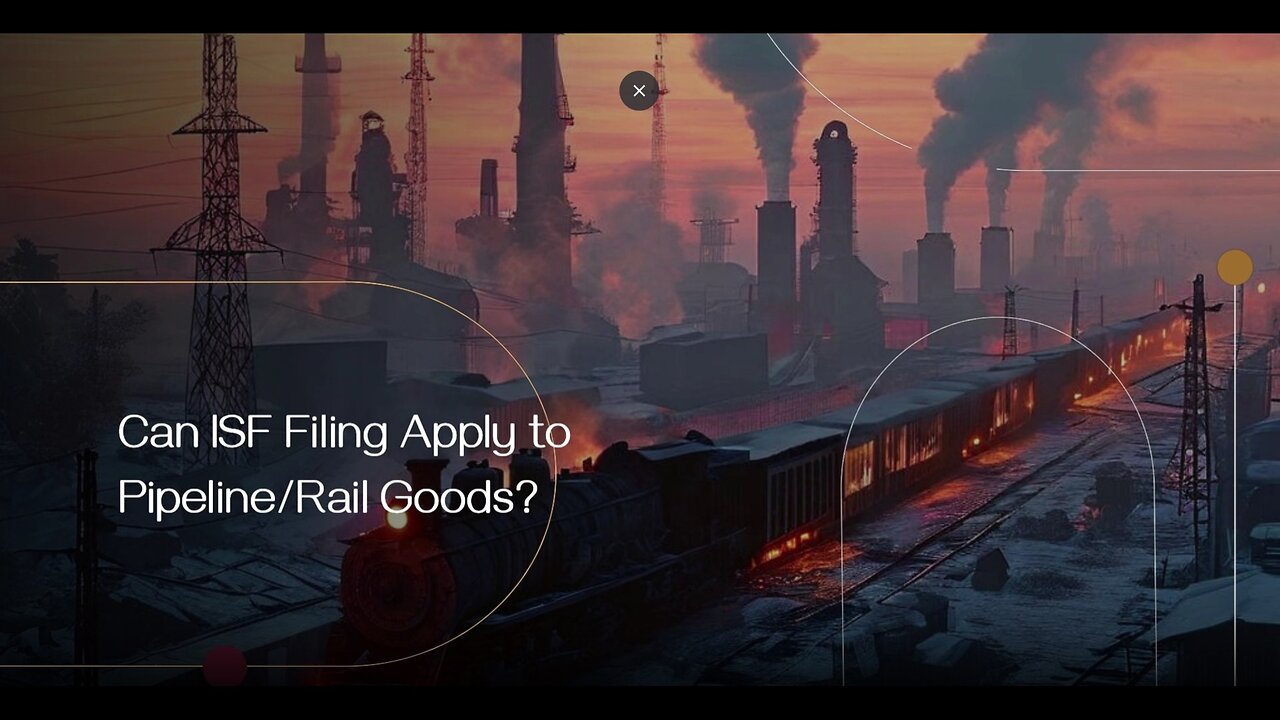Premium Only Content

Securing the Supply Chain: ISF Filing for Rail Shipments Explained
ISF Cargo | Phone: 786-865-0459
Email: isf@isfcargo.com | https://isfcargo.com
The Importer Security Filing (ISF) is a crucial requirement for importers to provide specific information about imported cargo before it arrives in the United States. However, the ISF filing requirements differ depending on the mode of transportation. Goods transported by pipeline are generally exempt from the ISF filing requirement due to the continuous and non-stop nature of pipeline shipments.
Unlike other modes of transportation, such as ocean vessels or airplanes, pipeline shipments have no intermediate stops or potential transfer of goods, thereby reducing the risk of unauthorized access or tampering. Therefore, the ISF filing is not mandatory for goods transported by pipeline.
On the other hand, for goods transported by rail, ISF filing is required. Although rail shipments are not exempt from the ISF requirement, importers or their authorized agents, such as customs brokers, must complete the filing no later than 24 hours before the cargo is laden onto the railcar for export to the United States.
The ISF filing for rail shipments includes the same 10 data elements required for other modes of transportation. This includes information about the shipper and consignee, manufacturer/supplier, country of origin, Harmonized System (HS) code of the commodity, container stuffing location, and more.
To ensure compliance with CBP regulations, it is crucial to accurately provide the required information for ISF filing in rail transport. Importers or their authorized agents should work closely with the rail carrier and establish efficient communication channels for the timely submission of the ISF filing. Any delays or non-compliance can result in penalties or shipment holds upon arrival in the United States.
To navigate the complexities and ensure compliance with CBP regulations, it is recommended to work with experienced customs brokers who have expertise in ISF filings for rail transport. Compliance with the ISF filing requirement for rail shipments contributes to the security of the supply chain and facilitates the smooth flow of goods.
In conclusion, while ISF filing is not required for goods transported by pipeline, it is mandatory for rail shipments. Importers must work closely with their authorized agents and rail carriers to timely submit the accurate ISF filing, contributing to the overall security of the supply chain. Working with experienced customs brokers can greatly facilitate compliance with ISF filing requirements.
#usimportbond #isfcustomsbroker #uscustomsclearing #isfentry
Video Disclaimer Here: This content is for educational use and not associated with any US government body.
00:18 - ISF filing is a mandatory requirement by U.S. Customs and Border Protection for importers to provide specific information about the cargo they are importing before it arrives in the United States.
00:46 - ISF filing is not required for goods transported by pipeline due to the continuous and non-stop nature of pipeline shipments.
01:10 - For goods transported by rail, ISF filing is required and must be submitted to CBP no later than 24 hours before the cargo is laden onto the railcar.
02:03 - Importers should work closely with rail carriers and customs brokers to ensure accurate and timely submission of ISF filings, contributing to supply chain security and smooth flow of goods.
-
 3:14:51
3:14:51
Barry Cunningham
13 hours agoTRUMP WEEKEND BRIEFING: THIS IS THE REAL THREAT TO AMERICA! (FYI...IT'S NOT WHO YOU THINK!)
58.1K66 -
 2:04
2:04
Sean Unpaved
18 hours ago $16.10 earnedUnpaved w/Sean Salisbury
107K6 -
 50:39
50:39
The Connect: With Johnny Mitchell
16 hours ago $8.80 earnedInside The War For Tijuana: How Mexican Cartels Turned Tijuana Into World's Most VIOLENT City
50.8K4 -
 12:34
12:34
TimcastIRL
15 hours agoWaPo Staffers QUIT Over Bezos’ Change To Opinion Section, Liberal Media MELTING DOWN
122K63 -
 24:55
24:55
MYLUNCHBREAK CHANNEL PAGE
1 day agoThe Sumerian King's List
124K43 -
 1:37:51
1:37:51
Man in America
19 hours agoIs Trump Using Gold to Dismantle the City of London Banking Cartel? w/ Eric Yeung
85.4K19 -
 33:50
33:50
The Why Files
8 days agoCryptids Vol. 3: The Antarctic Cover-up | Predators Beneath the Ice
142K138 -
 27:11
27:11
Stephen Gardner
19 hours ago🔥Trump Zelensky Meeting ends in IMPEACHMENT | MUSK shares major dirt on Joe Rogan Podcast
156K322 -
 2:40:23
2:40:23
Jewels Jones Live ®
3 days agoTRUMPARENCY | A Political Rendezvous - Ep. 112
139K38 -
 1:13:14
1:13:14
Michael Franzese
18 hours agoEmergency Livestream: Zelenskyy vs Trump, DOGE, Epstein Files, Elon Musk
150K105